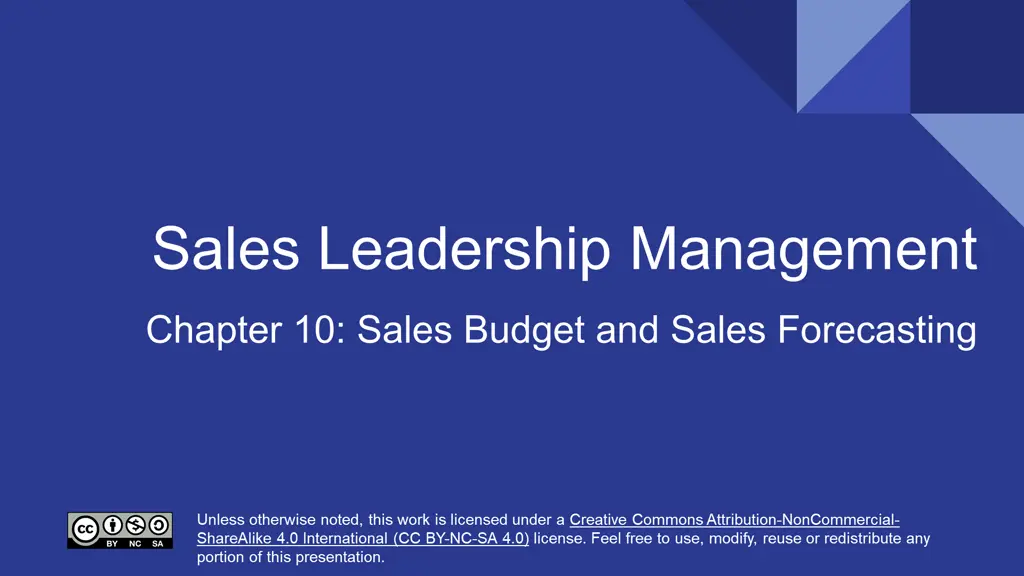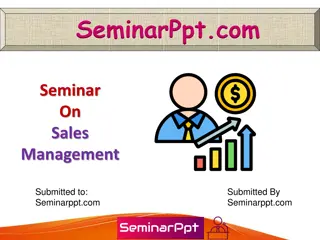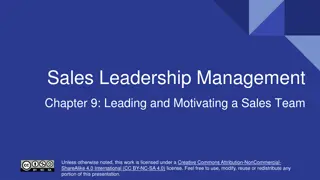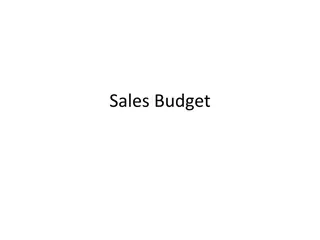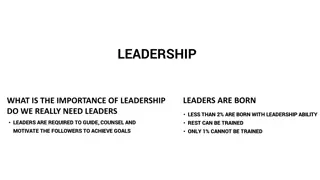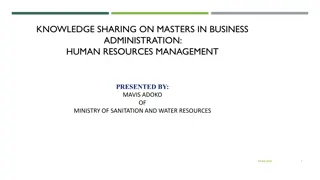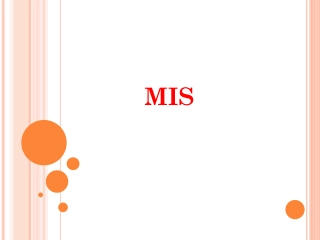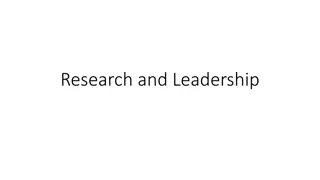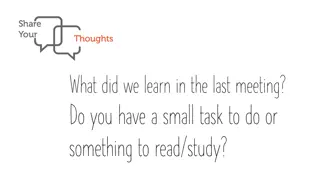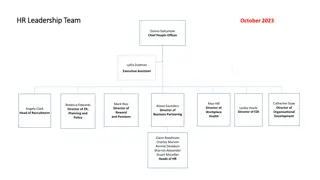Sales Leadership Management
The role of budgeting in sales planning, control, and decision making. Discover why accuracy is important in sales forecasting and explore different methods for preparing a sales budget.
Download Presentation
Please find below an Image/Link to download the presentation.
The content on the website is provided AS IS for your information and personal use only. It may not be sold, licensed, or shared on other websites without obtaining consent from the author. Download presentation by click this link. If you encounter any issues during the download, it is possible that the publisher has removed the file from their server.
Presentation Transcript
Sales Leadership Management Chapter 10: Sales Budget and Sales Forecasting Unless otherwise noted, this work is licensed under a Creative Commons Attribution-NonCommercial- ShareAlike 4.0 International (CC BY-NC-SA 4.0) license. Feel free to use, modify, reuse or redistribute any portion of this presentation.
10.0 Learning Outcomes In this chapter, we will: Recognize the role of budgeting in planning, control, and decision making Explain why budgets matter. Prepare a sales budget. Discuss budgeting methods Explain the difference between sales budgeting and sales forecasting Explain why accuracy is important in forecasting. Outline the different sales forecasting methods
10.1 Types of Budgets Master budget is the over-arching budget for the entire organization and represents a comprehensive financial plan for the entire organization. It is composed of two distinct parts: the operating budget and the financial budget. These in turn can be composed of other, smaller budgets. The operating budget shows the incoming-generating activities of an organization The financial budget shows an overall financial position by detailing the inflow and outflow of cash from a company
10.1 Flowchart of the Financial Planning Process Projected income statement (planned operating budget) Projected balance sheet (financial budget) Projected cost of goods sold Selling and administri ve budget Sales budget (dollars) Other expenses and taxes
10.2 Why Budgets Matter We can see if the company will make money or lose money at our anticipated level of sales. We can analyze our expenses based on expectations. We can hold staff accountable for their departments. It creates a living document to help grow the business and become more profitable over time. Photo by Tima Miroshnichenko, Pexels License
10.3 Sales Budget The sales budget is crucial for the budgeting process; it determines the entire operating budget's usefulness. It involves estimating demand for goods or services and assessing attainable profit based on this demand. Accurate information is vital: sales in units, sales price, manufacturing costs, and direct materials needed per unit require careful consideration. Underestimating customer demand can lead to customer dissatisfaction, while overestimating results in unnecessary spending. The sales budget details the expected sales in units and the sales price for the budget period. It is used to determine production needs and cash collection. Sales forecast considers past sales, competitor sales activity, industry trends, economy-wide trends, planned marketing campaigns, and weather. Fluctuations in sales budgets can occur due to new products, seasonal trends, or specific market characteristics. It is important to understand your business, your customers and your market when preparing a sales budget.
10.4 Budgeting Methods The Affordable Method Objective or Task Method Historical Method Competitive Parity Use a percentage of last year's sales to determine the sales budget. It does not take into account any changes in the market or unexpected circumstances. Is an approach to budgeting based on what the business can afford. Used often by small businesses. Budgeting based on competitive data or industry data. Marketing managers first determine the objectives with their communication. Then they determine what activities are necessary to accomplish the objectives.
10.5 Forecasting Forecasting is the process of making predictions of the future based on past and present data. Sales forecasting can involve either formal or informal techniques or a combination of both, Formal techniques use statistical tools and economic indicators to predict sales. Informal techniques may rely on intuition or judgment and can be modified based on environmental changes. Sales managers are responsible for preparing the sales budget in units and dollars. Accurate sales figures are crucial for the entire budgeting process. The sales budget affects selling, administrative, and production budgets. The production budget is needed to figure out direct materials, direct labour and manufacturing overhead budgets. After production budget comes the finished goods inventory budget.
10.6 Forecasting Accuracy Risk and uncertainty are central to forecasting and prediction; Indicating uncertainty levels is considered good practice. Accuracy is crucial to avoid overspending or losing sales opportunities. Sales forecasting is complex, considering factors like product cost and competitor reactions. As factors change, the forecast has to change as well. A common first step is to determine market potential, or total industry-wide sales expected in a particular product category for the time period of interest. After that, the company s sales potential can be estimated. A firm s sales potential is the maximum total revenue it hopes to generate from a product or the number of units of it the company can hope to sell. In your budget, you ll want to forecast the revenues earned from the product against the market potential, as well as against the product s costs.
10.7 Sales Forecast Methods - Qualitative forecasting Qualitative forecasting methods assume that one either does not have historical data or that one cannot rely on past historical data. They are subjective, based on the opinion and judgment of consumers and experts. Simple Extrapolation Historical Analogy Market Research Sales Force Expert Opinion Delphi Uses some data and simply makes a projection based on these data. You would ask the sales force to estimate what future sales might be Ask experts within the company to produce estimates of future sales A panel of outside experts would be asked to estimate sales for a particular product or service Finds a similar product s or service s past sales (life cycle) and extrapolates to your product or service Use of questionnaire s and surveys to evaluate customer attitudes toward a product or a service
10.7 Sales Forecast Methods - Quantitative forecasting Qualitative forecasting methods consists of techniques and methods that assume you can use past data to make projections into the future. Quantitative forecasting models are used to forecast future data as a function of past data. Seasonality Analysis Exponential Smoothing Causal models - regression analysis Trend Analysis Moving Average Assumes that sales will follow some form of pattern Takes recent class data for N number of periods, adds them together, and divides by the number N to produce a forecast Attempts to identify the proportion of annual sales sold for any given time Attempts to correct forecasts by some proportion of the past forecast error Causal models attempt to identify why sales are increasing or decreasing Regression relate s the value of the dependent variable to one or more independent variables
